Colorado’s Gordian Knot
Colorado’s “Gordian knot” refers to three amendments to the state constitution that, taken together, both limit revenue and require increased spending. The combination of these amendments severely limits the ability of the Colorado Legislature to efficiently run the state and provide services to Coloradans. Here is how it came to be:
The Gallagher Amendment of 1982 limits statewide property tax revenue to a formula that is 45 percent homeowner taxes and 55 percent commercial taxes. As the population has grown and property values have increased, residential tax rates have dropped to maintain the statewide ratio. This affects school districts differently depending on the mix of residential and commercial uses in their boundaries. As a result, local property tax revenue to some school districts has dropped dramatically, requiring the state budget to make up the difference.
The Taxpayer Bill of Rights (TABOR), passed in 1992, contains revenue growth restrictions using a formula for taxes that is indexed to inflation and is based on the prior year’s revenue. Cuts that occur during temporary downturns in the economy become permanent (the so-called ratchet effect) due to this formula, which also slows recovery and prevents building up savings in good times. TABOR contains the most restrictive tax and spending limits in the country, severely limiting the ability of public officials to adjust the budget to reflect changing needs.
Amendment 23 was passed in 2000 to reverse the budget cuts that occurred in Colorado school districts in the ’90s. It called for the state legislature to increase education funding annually by the rate of inflation plus 1 percent for the first 10 years (and the rate of inflation thereafter), along with other specific provisions to restore education funding.
Amendment 23 requires increased spending at the same time TABOR and Gallagher reduce revenue. The combined effect of these three amendments creates an unsustainable fiscal formula for Colorado, our “Gordian knot,” that has no solution as long as all three amendments remain in effect. Repeal of any or all of these amendments would require a ballot question to Colorado voters.
In 2016, the upshot of all this is the need to cut approximately $350 million from the state’s budget despite healthy revenues; otherwise, TABOR revenue caps will be exceeded. The cuts would come from transportation, education and other services. At the same time, taxpayers would receive refunds ranging from $25 to $125.
As a solution, the governor has proposed converting something called the Hospital Provider Fee (HPF) into an enterprise fund. That would remove an estimated $750 million from the state’s general fund, keeping the remaining state’s revenue under the TABOR revenue limits. The proposal is not expected to gain majority support in the Republican-controlled Senate.
The Building a Better Colorado (BBC) group is working on a fall ballot initiative to relieve the state from the TABOR revenue caps. BBC is a “diverse, nonpartisan coalition” addressing “common challenges” such as the election process, the state’s fiscal policy and the state constitution amendment process. Even if it passes, a November amendment to the TABOR provisions of the Colorado Constitution will come too late to resolve the immediate, fiscal year 2016-17 budget issues.
![]()
Without exception, the state budget is the top concern of our northeast area legislators. Because of Colorado’s fiscal Gordian knot, the legislature’s focus will be on what further cuts to make despite healthy state revenues. New policy initiatives will be limited to proposals that don’t require new expenditures. The other key takeaway is the fact that term limits will affect four of our five legislators at the end of this year. Some have definite future plans; others are still formulating them.
State Sen. Pat Steadman (D) represents Senate District 31, which includes Montclair, Mayfair, Hale and Lowry.
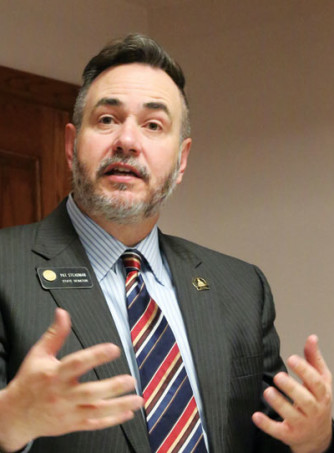
State Sen. Pat Steadman (D)
Steadman uses the terms “austere” and “crisis” in referring to this year’s budget. He says he is not hopeful that the governor’s plan to create an enterprise fund for the Hospital Provider Fee (HPF) will succeed. Without that solution, the legislature will have to take up the governor’s forecast for about $370 million in cuts—“none of them good.” He said leaders in the education and health fields are “alarmed” by the cuts they see coming.
He said the Building a Better Colorado (BBC) group’s possible ballot initiative this fall, which would roll back TABOR’s spending caps, may be the way the problem gets addressed but it won’t help with this year’s budget woes. He said the BBC ideas are “on a separate track” and won’t impact the General Assembly’s immediate focus on the HPF solution.
For Steadman, transportation may be the state-provided service that best characterizes a state some describe as having one foot on the brake pedal while the other is on the accelerator. He recalls a CDOT presentation a couple of years ago that described 52 percent of highway surfaces as being in a poor condition. Steadman rued that we are a growth state that needs more transportation capacity but can’t maintain its existing system.
As evidence of his commitment to restoring Colorado’s budget, Steadman says he may run a bill that is admittedly not popular: eliminating or reducing the senior homestead exemption. Since 2000, Colorado has granted seniors 65 or older a “homestead” exemption, forgiving half of property taxes owed, up to the first $200,000 in value, for personal residences they have lived in for a decade or more. Steadman says this program is growing at an alarming rate, adding to Colorado’s budget woes.
Other bills Steadman anticipates introducing include re-authorization of the Scientific and Cultural Facilities District; two criminal justice bills dealing with restitution; and two bills to update Colorado statutes, one in regards to marriage, the other concerning sexually transmitted infections.
Steadman is term-limited but has not announced his plans.
State Sen. Mike Johnston (D) represents Senate District 33, which includes Stapleton and Park Hill.
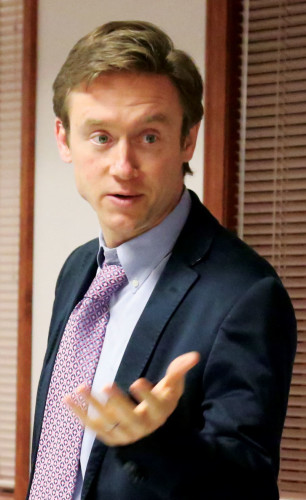
State Sen. Mike Johnston (D)
On the one hand, the budget issue will “dominate” the legislative session, says Sen. Johnston: “It’s the vehicle for every expenditure that people care about.” On the other hand, Johnston believes the “Republican-controlled Senate has laid out pretty clearly that they will refuse to pass anything that will change the Hospital Provider Fee (HPF). I think that absent a big surprise, that issue is virtually dead.” As hopes fade for conversion of the HPF, he believes interest will grow in proposals expected from the BBC public interest group. “It will be the only vehicle to change the law.”
Johnston’s attention is more focused on bills he is carrying: a proposal to allow the state’s “permanent land fund” (using revenues derived from state lands) more “investment freedom” to help it earn more than its traditional 2 percent return. The hoped-for increase in earnings from the fund would be directed to rural school district building programs; a crime prevention bill that would allow expanded use of DNA sampling; and a bill to expand electric vehicle charging stations statewide.
Johnston is term-limited but has not announced his plans.
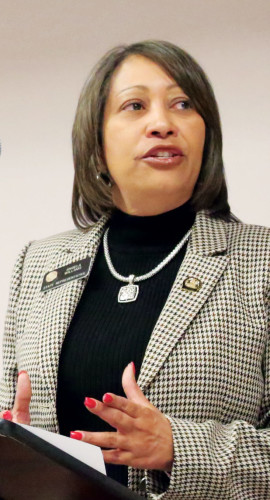
State Rep. Angela Williams (D)
State Rep. Angela Williams (D) represents House District 7, which includes all but two Stapleton precincts, and Green Valley Ranch, Montbello and Park Hill to Monaco.
The state budget and the HPF are at the top of Rep. Williams’ list as well. She said the HPF conversion is a solution that “would not increase taxes and would save us from cuts.” She is equally pessimistic about there being any solution forthcoming: “The legislature itself can sometimes be the knot.”
Unlike the other legislators with whom we spoke, she does hold out hope for General Assembly action on the issue of construction defects, which has hampered construction of for-sale condominiums at a time of record rent hikes in the region. She says we still need a “statewide solution to encourage affordability” despite the efforts of several local governments, including Denver, to re-balance the relationship between builders and buyers of condo units in hopes of reducing construction defects litigation.
Williams will introduce several bills that elaborate on issues she has worked on in previous years: creation of a business intelligence center to promote more efficient and transparent ways for the state to communicate with small businesses; revising state procurement rules to enhance opportunities for small and minority-owned businesses; continuing tweaks to the state foreclosure rules; a bill to give agencies the tools to obtain essential background information on previous employment when hiring police officers; and a measure to expand broadband access in rural areas.
Williams is the only one of northeast Denver’s five state-level elected officials who is not term-limited. However, she is an announced candidate for Sen. Johnston’s District 33 seat.
State Rep. Beth McCann (D) represents House District 8, which includes all of Park Hill from Locust to Colorado Blvd., Hale, East Colfax, and two precincts in Stapleton just north of Montview and east of Central Park Blvd.
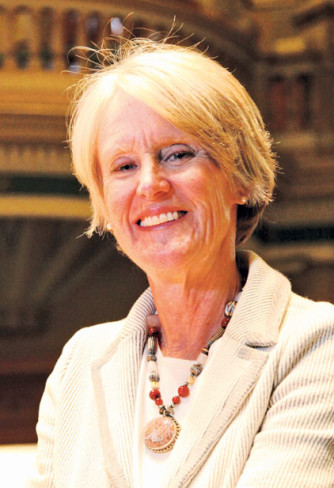
State Rep. Beth McCann (D)
McCann’s views on the budget situation this session exactly mirror Sen. Johnston: she’s not hopeful for a solution; none of the governor’s cuts are good for the state; Colorado will continue to grow, putting more pressure on services; and the BBC ballot initiative may be the way the issue finally gets addressed.
She shares Rep. Williams’ hope that the legislature will act this year on construction defects, noting that she supported the bill that was debated but not passed last year.
McCann’s bills run the gamut: a criminal justice bill that would greatly limit solitary confinement of juveniles; changing the purposes of parole to help reflect the need to assist parolees to find housing and employment and become productive members of society; a bill to strengthen the Independent Ethics Commission by allowing it to hire its own attorney and to file its own cases; and a proposal to require stand-alone emergency rooms to be more affirmative in alerting potential patients to the real costs of such care.
McCann also is term-limited but has very definite plans for herself after the legislature: she is an announced candidate for Denver district attorney. She faces a primary against two fellow Democrats and, if successful, a general election campaign against an unaffiliated candidate.
State Rep. Lois Court (D) represents House District 6, which includes all of Lowry, E. Montclair, Montclair and Mayfair.
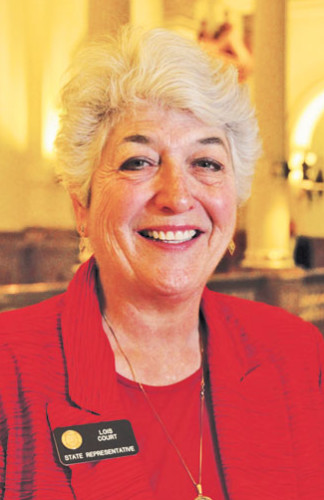
State Rep. Lois Court (D)
Court explains the state’s budget dilemma by analogy to a homeowner: facing a budgetary squeeze, the homeowner has three choices: increase revenue, take on new debt (e.g., credit card, second mortgage) or cut expenses. Court says the difference is that Colorado’s budgetary Gordian knot leaves the legislature with one choice: spending cuts. She maintains some hope that the HPF conversion will prevail, noting strong support in the business community and by major newspapers. She said the budget issue for this fiscal year must be fixed and hopes that a BBC-led ballot initiative will succeed, allowing future state budgets to meet the needs of a growing state.
In terms of personal priorities, she intends to bring back an end-of-life options bill to benefit the terminally ill with less than six months to live. Although a similar bill did not get out of committee last year, she hopes it will get to the floor for a vote in 2016. Her optimism is based on past polling that indicates 68 percent of the electorate favors such a bill. Her other priority will be campaign finance reform, specifically applying statewide standards on contribution limits, transparency and disclosure to school board elections.
Court is term-limited and is an announced candidate for the District 31 seat currently held by Sen. Steadman.



0 Comments